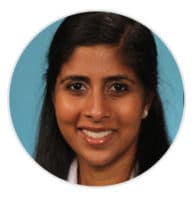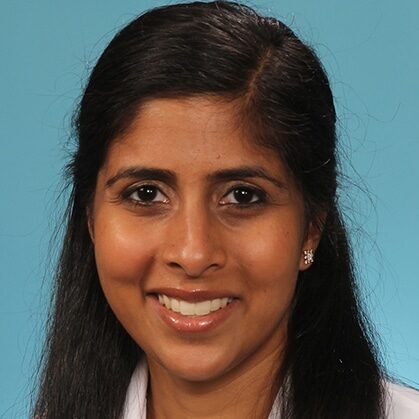Researcher Spotlight: Neha Mehta-Shah, MD
Washington University in Saint Louis

Dr. Mehta-Shah is Assistant Professor at the Washington University School of Medicine in Saint Louis. Her Lymphoma Clinical Research Mentoring Program (LCRMP) project seeks to develop a method for identifying residual disease in peripheral T-cell lymphomas (PTCL). PTCL is a group of rare lymphomas most commonly treated with combination chemotherapy autologous stem cell transplant. However, it is often difficult to identify the patients who will most benefit from transplant after therapy, as residual lymphoma cells can be difficult to detect via CT (computerized tomography) or PET (positron emission tomography) scans. Dr. Mehta-Shah and her collaborators are evaluating two methods for testing patient blood samples to detect these residual PTCL cells. “Patients with these rare diseases suffer from our lack of knowledge regarding how to tailor treatment to specific disease types,” Dr. Mehta-Shah says. “These techniques may also be used to develop liquid biopsies for mutational profiling of tumors or serve as a method to help us determine which patients are more likely to relapse from these aggressive lymphomas.”
Dr. Mehta-Shah says that “she was one of those kids who knew she wanted to be a doctor in elementary school,” following in the footsteps of her mother, a pediatrician. “Then, in high school, I spent time with a pediatric hematologist/oncologist and became involved in laboratory research. After that, I realized I wanted to pursue a career in academic oncology.” She received her MD from Northwestern University’s Feinberg School of Medicine, where she became acquainted with Steven Rosen, MD and his research on cutaneous T-cell lymphoma. She completed her residency and fellowship at Memorial Sloan Kettering Cancer Center under the direction of Steven Horwitz, MD before moving to Washington University. “Steve [Horowitz] taught me to think critically, doctor compassionately, lead gracefully, and reach for the stars,” she notes.
Dr. Mehta-Shah hopes to develop her career to become a leader in clinical research efforts to improve treatment for patients, as well as teach and mentor others. She sees her participation in the LCRMP as a step forward in this development. “Improving our knowledge about lymphoma from all fronts is critical to advancing the field. I anticipate that the mentorship that the Workshop will provide will be equally valuable to my success.” She adds that, ultimately, her patients provide the greatest inspiration to continue her work. “They are the reason we do all of this research. I hope that in my lifetime I can see them reap the benefits of the efforts of our research community.”

